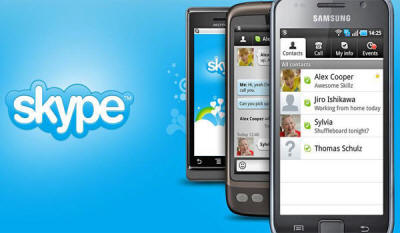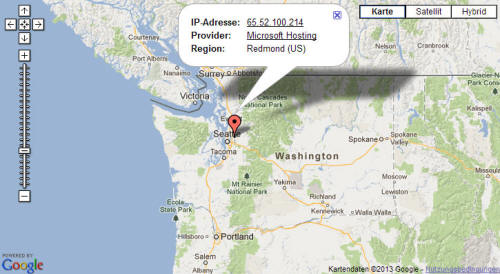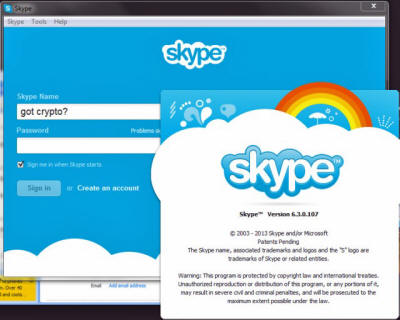|
14 May 2013 from H-OnLine Website
Anyone who uses Skype has consented to the company reading everything they write.
The H's associates in Germany at heise Security have now discovered that the Microsoft subsidiary does in fact make use of this privilege in practice. Shortly after sending HTTPS URLs over the instant messaging service, those URLs receive an unannounced visit from Microsoft HQ in Redmond.
A reader informed heise Security that he had observed some unusual network traffic following a Skype instant messaging conversation. The server indicated a potential replay attack. It turned out that an IP address which traced back to Microsoft had accessed the HTTPS URLs previously transmitted over Skype.
Heise Security then reproduced the events by sending two test HTTPS URLs, one containing login information and one pointing to a private cloud-based file-sharing service.
A few hours after their Skype messages, they observed the following in the server log:
65.52.100.214 - - [30/Apr/2013:19:28:32 +0200] "HEAD /.../login.html?user=tbtest&password=geheim HTTP/1.1"
Source: Utrace
They too had received visits to each of the HTTPS URLs transmitted over Skype from an IP address registered to Microsoft in Redmond.
URLs pointing to encrypted web pages frequently contain unique session data or other confidential information. HTTP URLs, by contrast, were not accessed. In visiting these pages, Microsoft made use of both the login information and the specially created URL for a private cloud-based file-sharing service.
In response to an enquiry from heise Security, Skype referred them to a passage from its data protection policy:
A spokesman for the company confirmed that it scans messages to filter out spam and phishing websites.
This explanation does not appear to fit the facts, however. Spam and phishing sites are not usually found on HTTPS pages. By contrast, Skype leaves the more commonly affected HTTP URLs, containing no information on ownership, untouched.
Skype also sends head requests which merely fetches administrative information relating to the server. To check a site for spam or phishing, Skype would need to examine its content.
Back in January, civil rights groups sent an open letter to Microsoft questioning the security of Skype communication since the takeover.
The groups behind the letter, which included the Electronic Frontier Foundation and Reporters without Borders expressed concern that the restructuring resulting from the takeover meant that Skype would have to comply with US laws on eavesdropping and would therefore have to permit government agencies and secret services to access Skype communications.
In summary, The H and heise Security believe that, having consented to Microsoft using all data transmitted over the service pretty much however it likes, all Skype users should assume that this will actually happen and that the company is not going to reveal what exactly it gets up to with this data.
Think Again... May 20 2013
from
ArsTechnica Website
Ars catches Microsoft accessing links we sent in our test messages.
If you think the private messages you send over Skype are protected by end-to-end encryption, think again.
The Microsoft-owned service regularly scans message contents for signs of fraud, and company managers may log the results indefinitely, Ars has confirmed. And this can only happen if Microsoft can convert the messages into human-readable form at will.
With the help of independent privacy and security researcher Ashkan Soltani, Ars used Skype to send four Web links that were created solely for purposes of this article.
Two of them were never clicked on, but the other two - one beginning in HTTP link and the other HTTPS - were accessed by a machine at 65.52.100.214, an IP address belonging to Microsoft.
For those interested in the technical details, the log line looked like this:
'65.52.100.214 - - [16/May/2013 11:30:10] "HEAD /index.html?test_never_clicked HTTP/1.1" 200 -' The results - which were similar but not identical to those reported last week by The H Security - prove conclusively that Microsoft not only has ability to peer at the plaintext sent from one Skype user to another, but that the company regularly flexes that monitoring muscle.
In one sense, this shouldn't come as news. Skype's privacy policy clearly states that it may (emphasis added) use automated scanning within Instant Messages and SMS to identify spam and links to sites engaged in phishing and other forms of fraud.
And as Ars reported last year, since Skype was acquired by Microsoft, the network running the service has been drastically overhauled from its design of the preceding decade.
Gone are the peer-to-peer "supernodes" made up of users with sufficient amounts of bandwidth and processing power; in their place are some 10,000 Linux machines hosted by Microsoft. In short, the decentralization that had been one of Skype's hallmarks was replaced with a much more centralized network.
It stands to reason that messages traveling over centralized networks may be easier to monitor.
Perception, meet reality
Still, there's a widely held belief - even among security professionals, journalists, and human rights activists - that Skype somehow offers end-to-end encryption, meaning communications are encrypted by one user, transmitted over the wire, and then decrypted only when they reach the other party and are fully under that party's control.
This is clearly not the case if Microsoft has the ability to read URLs transmitted back and forth.
Specifics of the Microsoft scanning remain unclear; one possibility is that the scanning and spam-checking happen on Microsoft servers as communications pass through supernodes.
Another possibility is that the Skype client on each end-user machine uses "regular expression" programming techniques built into the software and sends only the links to Microsoft servers.
Helping to feed this confusion about exactly what measures are taken to protect Skype messages is Microsoft's management, which remains vague about the precise type of encryption its service uses.
Asked for comment on this story, a spokeswoman offered a statement that was identical to a single sentence in the privacy policy. The statement didn't address my other question that's equally important: does Microsoft record the links and other content sent over Skype?
Eventually I found the answer, and unfortunately it gives Microsoft all the wiggle room it needs.
It states:
To be fair, Microsoft's scanning of Skype messages isn't too different from techniques Facebook reportedly employs, and what any number of other online services do, too.
As Green notes, these companies have a duty to make sure their services aren't abused to circulate malware.
What's different in the case of Skype is the misunderstanding among many users that links and other content sent over the service are private. This misunderstanding is all the more unfortunate given the possibility that this information plucked out of private messages could be logged and retained for as long as some nameless, faceless Microsoft manager deems appropriate.
Add to that the fact that a server bearing a Microsoft IP address very well may click on any link you send over Skype and it may not be such a good option for dissidents trying to lay low.
So the next time you use Skype, enjoy the clarity of the voice communications, its generally slick user interface, and its many other benefits. Just don't think the service can't peer into your messages and store indefinitely what Microsoft managers want.
It can, and until officials specifically disclose their practices, users should assume it does.
|



